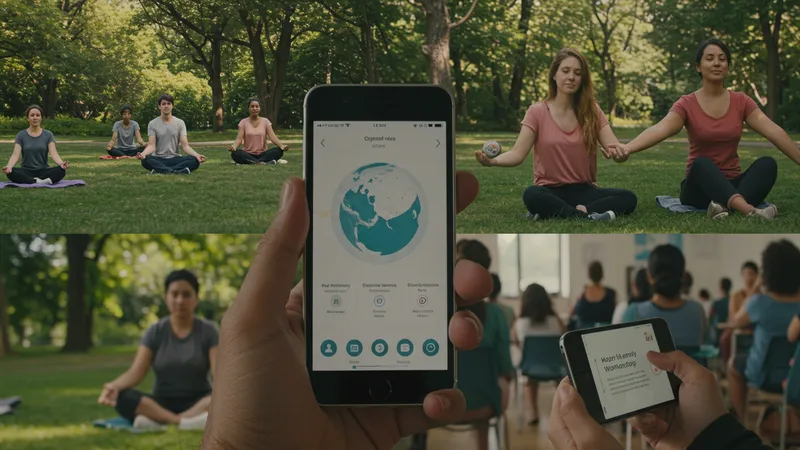

Mental health and wellness focus on cultivating resilience, emotional regulation, and a stable mindset to navigate life’s complexities more effectively. Achieving a balanced mind requires self-awareness, stress management, and purposeful habits that can maintain well-being amidst daily pressures. Instead of seeking perfection, this approach emphasizes steady progress and practical strategies, allowing individuals to thrive both personally and professionally.
Maintaining mental wellness is not simply about avoiding mental health challenges; it’s about proactively establishing routines and practices that fortify psychological balance. Techniques such as mindfulness, structured social connections, and skillful time management create a framework in which emotional stability flourishes. These everyday actions support adaptability, clarity, and productivity, empowering individuals to respond confidently to both challenges and opportunities life presents.

Digital wellness tools like Calm and Headspace have experienced increased popularity across Canada, offering on-demand coping strategies for stress and sleeplessness. Both apps feature guided meditations, soothing soundscapes, and robust educational content, allowing individuals to build daily mental fitness routines at their own pace. These platforms democratize access to mental health support—no appointment or travel required.
The Canadian Mental Health Association provides an expansive web of supports, ranging from educational guides to in-person programming tailored for diverse populations. Their services offer essential resources for emotional resilience, anxiety management, and community engagement, all adapted for Canada’s multicultural needs. Cost-effective and accessible, CMHA often coordinates with other local agencies for broad coverage.
Compared with many international options, Canadian-based support organizations prioritize accessibility and inclusivity. For example, digital platforms like Calm and Headspace can be especially valuable in rural or remote areas where local services are limited. This empowers users to take an active role in maintaining emotional health irrespective of geographic barriers, time constraints, or stigma.
Statistics from the Canadian Mental Health Association suggest that 1 in 5 Canadians experience some form of mental health challenge each year. Integrating app-based solutions or engaging with peer support networks can provide essential coping mechanisms, particularly when traditional therapy may be temporarily out of reach. These practices have become more relevant than ever as Canadians adjust to remote work and increasing digital connectivity.
By combining digital resources with national support networks, Canadians gain the tools to recognize, address, and manage mental wellness challenges. The next step is understanding which strategies fit unique personal needs and circumstances—insights that reveal even deeper benefits as we explore further.
Core elements of mental health and wellness strategies encompass self-care routines, mindfulness training, and regular connection with support networks. In Canada, these practices often reflect the country’s commitment to inclusive and preventative approaches—whether through public organizations like CMHA or digital platforms like Headspace and Calm. Implementation often starts with small, daily habits, making the process less daunting and more accessible for people with busy lives or limited resources.

Mindfulness-based stress reduction (MBSR) and guided meditation have shown strong adoption rates, especially in Canada’s larger cities. For instance, users of Calm can access guided sessions tailored to stress management, emotional clarity, and even workplace focus. These structured programs help users develop skills in attention control and emotional self-regulation—abilities that have measurable impacts in both their professional and private lives.
National organizations such as the Canadian Mental Health Association reinforce wellness by providing educational campaigns and local workshops designed for cultural competency. Services frequently include low-cost or free group sessions, toolkits, and peer-led activities—bridging gaps for many who might otherwise hesitate to seek traditional clinical care. Programs like “BounceBack” and other CMHA initiatives illustrate how mental health support is made accessible for a broader range of Canadians, regardless of age or background.
The interplay between digital and community-based approaches means that Canadians can personalize their mental health journeys. For example, one might start with meditation exercises using Headspace and then seek additional guidance from local support groups via the CMHA. This adaptability allows for a continuously evolving, needs-based approach to sustaining mental wellness—a critical factor in today’s rapidly changing world. Continue reading for practical tips and lesser-known features of these strategies.
Canadian consumers have embraced digital solutions like Calm and Headspace for their flexibility and anonymity. These platforms allow individuals to pursue mental wellness privately and on their own schedules, which is crucial in overcoming barriers such as stigma or unpredictable work hours. Structured mindfulness exercises housed within these apps console users during times of stress, providing a buffer against the demands of everyday life.

On the other hand, national and regional organizations such as the Canadian Mental Health Association introduce social connection and community-based accountability to wellness. Participation in group programs and events fosters a sense of belonging, which is proven to reduce feelings of isolation. In particular, peer-led workshops offer relatable guidance, practical coping tactics, and encourage help-seeking behavior among Canadians who might otherwise go unsupported.
Research highlights suggest participants who combine app-based mindfulness practices with in-person or group therapies report higher satisfaction and perceived improvement in emotional regulation. Leveraging multiple strategies reduces the risk of overload or disengagement from any single approach and provides a wider network of resources, crucial in emergencies or moments of crisis.
Canadian statistics from Mental Health Research Canada indicate that nearly 40% of adults have used online resources or applications to support their well-being since 2020. This surge aligns with a growing public understanding of preventative care, making hybrid models—digital app use with local support networks—a sustainable, scalable strategy. Up next: explore actionable steps for building and sustaining these balanced practices.
Building sustainable habits requires integrating mental health activities into daily routines. Many Canadians start their mornings with guided Calm sessions or reflective meditations from Headspace, finding this sets a positive tone for the day. Short, consistent practice proves more effective for long-term resilience than infrequent, lengthy sessions. Small commitments—such as 5-minute breathing exercises—can yield notably improved focus and mood regulation throughout the workday.

Community support, whether accessed virtually or in local hubs via the Canadian Mental Health Association, helps transform isolated practices into shared experiences. Peer check-ins and group discussions offer feedback, validation, and subtle accountability, making positive habits more likely to stick. These local initiatives also surface culturally specific challenges and solutions, customizing support for Indigenous communities, newcomers, and other diverse groups across Canada.
Those facing barriers—geographic, linguistic, or economic—can adapt strategies to fit their circumstances. The wide array of tools and materials from the CMHA and digital apps ensures flexibility: users might journal gratitude daily, join a guided group walk, or take advantage of text-based support. Experimenting with various methods encourages self-discovery and a tailored approach to personal growth and stability.
Recent national surveys reveal that Canadians who combine digital routines with social engagement demonstrate greater self-reported well-being and reduced burnout. The adaptability of these tools helps maintain engagement through changing life circumstances. As we move forward, let’s delve into how to troubleshoot setbacks and stay motivated when balancing mental health becomes challenging.
Common challenges in maintaining balanced mental health include motivation lapses, unexpected life disruptions, and fluctuating emotional states. Canadians may find it difficult to stay consistent with practices like meditation or group participation due to stressors such as seasonal changes, workload spikes, or family responsibilities. Building in flexibility—such as varying the time of day for Calm app sessions or participating remotely in CMHA events—can offset these disruptions.

Another key to resilience is planning for setbacks. Many digital tools offer progress tracking and reminders, making it easier to resume routines after interruptions. For example, Headspace users can set gentle daily nudges, while local CMHA chapters often run drop-in sessions for those who need impromptu support without pressure or pre-registration. This safety net enables Canadians to re-engage with wellness strategies as their circumstances evolve.
For some, stigma or discomfort around discussing mental health still creates hurdles. Resources provided by the Canadian Mental Health Association include educational guides and stigma-busting campaigns tailored to diverse communities. Digital tools offer a degree of privacy and self-direction, which help those who prefer a more discreet approach to seeking support. These complementary strategies ensure that mental wellness remains attainable for all—even when direct outreach feels intimidating.
Sustained mental wellness in Canada hinges upon self-reflection, community, and adaptability. By weaving together structured routines, accessible digital aids, and supportive networks, Canadians empower themselves to cultivate ongoing balance. The value lies not in perfection, but in consistent, compassionate attention to mental health needs—ready to evolve as life circumstances shift.